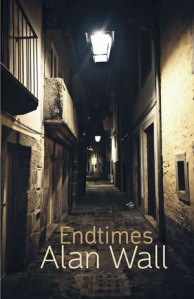Endtimes, Alan Wall, £8.95, Shearsman Books
reviewed by Fiona Moore

“It is always the endtime.” That, from poem 17 of the main sequence ‘Patmos, Jerusalem, Rome…’ sums up this book. The speaker is St John of Patmos, author of the Book of Revelation, full of apocalyptic visions. Endtimes explores, mostly through him, how humans have made and remade their own apocalypse. In poem 23 bells on Patmos, occupied by Romans, Turks, Italians* and Nazis, ring,
as though it had come already:
the end of all empires.
Except the one that’s being minuted
even as we speak.
Soon boundaries of time and space feel self-imposed. From ancient Rome to the USSR of Mandelstam and Stalin, from Fallujah to the Belgian Congo, from Goebbels’ poisoned children to Gerald of Wales’ dragon, elements of catastrophe are thrown up and come back down in different permutations. Perspective is broad, detail graphic. Gerald’s dragon breathes industrial revolution smoke. Eichmann “took the notes” at the Wannsee Conference, poem 24:
As he would say, there’s always someone prophesying
in a cellar among rats
on Patmos, in Warsaw
even at the edges of Berlin
with the Führer himself still flourishing.
Before cleansing takes its final turn.
The form is plain, a vehicle for the rich content: free verse, whose line breaks go with the sense. The main variant is poem length, from near-epigrammatic to two/three pages. Poetry allows air into the dense subject matter.
Wall’s tone mixes dryness and relish; language, imagery and syntax are vivid. He gets away with portentous statements, but then the writer of Revelation can get away with anything. There’s a lot of telling, which is fine. Occasionally it’s over-explanatory, as when St John (here also St John of the Gospel) says in ‘Those Tombs in Ephesus’, “My work now is/ writing his life, tending his mother”.
The history is mostly from a western perspective. It’s very male – women are whores, wives, mothers. OK, just about, for fall of empires.
I was surprised not to see more on climate change, surely tomorrow’s apocalypse, taking over from 9/11. (There’s a Dick Cheney epigraph, “We also have to work the dark side…”) Revelation contains chilling visions of earthly disaster: earthquake, the sun “black as sackcloth of hair”, trees and grass burnt up, sea creatures dying.
One section, ‘Ivory’, touches on exploitation/extinction, but the focus remains on human ills. Another is narrated by quirky ravens (see Elijah, Poe, the Tower). From ‘Operatic’:
a derelict camper van
in the field below
has a god growing wise inside it.
He swallows winds
the way his antique fathers did in Egypt once.
I don’t know how wide this book’s appeal will be. I gobbled it up. The effect is cumulative. Poem 10:
Stanley Kubrick in Full Metal Jacket
re-creates Vietnam’s Armageddon
on the site of a derelict factory
in South London.Apocalypse being a moveable feast
even at times a Potemkin village
waiting for Caesar in all his finery to go by
before the deconstruction.
____
* The Dodecanese were occupied by Italy from 1911, rather than invaded by Mussolini as in this poem.
Fiona Moore
http://displacement-poetry.blogspot.co.uk/
